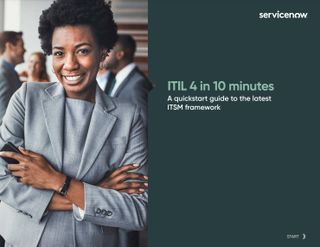What is the ITIL certification and why do you need it?
Find out how to improve your IT infrastructure through this certification

ITIL is one of the most important IT certifications out there - it’s a collection of best practices for enhancing and establishing an Information Technology Service Management (ITSM) process.
It was formerly known as the Information Technology Infrastructure Library qualification and was published in the 80s as a collection of books, before being incorporated into the AXELOS group of certifications. The main objective of the ITIL is to aid businesses in creating long-lasting IT infrastructures that can scale at pace, foster growth, and encourage change over time.
It also helps businesses to meet the obligations set out in the ISO 20000 certification, ensuring that the ITSM processes of an organisation meets the operational demands of a business with international best practices.
ITIL 4, the latest version of the framework, was released in February 2019 and is the most major update to the certification since 2007. It aims to keep the programme modern and up-to-date with trends in IT operations and development, expanding the remit of ITIL 3 by providing more flexibility for businesses as they carry out digital transformation projects.
Four key aspects of ITIL 4 need to be taken into account to ensure a holistic approach to service management is implemented. The elements of this are information and technology, organisations and people, partners and supplies, as well as value streams and processes.
Why should you use it?
Adopting ITIL can bring several benefits to your organisation, with the most significant being the universality of a single platform of support and quality. This will make it easier for both international and local partnering organisations to comprehend how the business functions.
ITIL can also establish a sense of openness in an internal IT help desk, for example, making it much easier for workers to access the information they need, which saves time and effectively boosts productivity.
Get the ITPro. daily newsletter
Receive our latest news, industry updates, featured resources and more. Sign up today to receive our FREE report on AI cyber crime & security - newly updated for 2024.
Another major benefit is the extent to which it future proofs your business. Using ITIL principles, your IT infrastructure will be able to cope far better with unexpected business growth and system disruption, particularly as the helpdesk will have a vital role in the process.
Who uses ITIL?
ITIL is used by many organisations across the world, both large and small, and public and private. Some notable examples include Disney, Liverpool Victoria, Müller, and the UK’s HMRC.
For example, Müller made use of ITIL processes as part of an infrastructure upgrade, creating a bridge between its service desk and the rest of its IT department. The service desk’s key performance indicators (KPIs) exceeded 99% in an average week once the change was made.
At Disney, it was the executive branch that first pushed ITIL down to the rest of the business, as part of an awareness campaign to address several company issues. To initiate change, 250 employees were trained in ITIL Foundation, 50% of which signed up to the official ITIL certification exam.
The certification
ITIL v3 certification has a modular approach and is made up of a series of qualifications that cover the best practices in diverse ways.
There are five certification levels: Foundation, Practitioner, Intermediate, Expert, and Master.
Foundation
This entry level certification aims to give individuals a general awareness of the key elements, concepts, and terminology of the framework. It's aimed at those who need a basic understanding of the ITIL framework or who need to understand how ITIL can be used to enhance IT service management in an organisation, as well as IT professionals who need to be informed about ITIL in their current organisation.
The one-hour exam is made up of 40 multiple choice questions and you need 26 marks out of the 40 (65% correct) to pass. As the name suggests, this module is the one on which the other four are built
Practitioner
Axelos insists that the Practitioner certification not only helps individuals speak the language of ITIL but also to "translate it and use it in practice".
This module can be taken at any stage in the ITIL certification scheme after Foundation and builds on other methodologies and frameworks, like DevOps, Agile, and Lean. It also improves efficiency, productivity, and collaborations between ITSM and the wider business, Axelos claims.
It covers three subjects: Organisational Change Management, Communication, and Measurements and Metrics.
The exam follows the same format as the Foundation test but needs 28 marks to pass (70% correct) and is two hours and 15 minutes long. It's also an open book exam.
Intermediate
This module, which you can take if you have passed the Foundation exam, has two in-depth areas of study: Service Lifecycle and Service Capability.
Service Lifecycle is relevant to people working in a management or team leader role where who need to work across multiple teams. The other part, Service Capability, is for those who want to get specific knowledge in one or more processes, such as operational support and analysis.
For this module, you will not be able to self-study and then take the exams, you must attend Axelos training to complete it.
Expert
This module is for candidates who have achieved a "well-rounded, superior knowledge and skills base in ITIL Best Practices".
It's meant to help you advance your career in the IT service management field and you will need to pass it if you expect to take the Master level the highest level of ITIL certification.
To study this module, you need to have earned a minimum of 17 credits from the Foundation and Intermediate modules. You then need to take the "Managing Across the Lifecycle" module too. The pass mark for the exam in this module is 35/50 (70%) and lasts for two hours.
Master
This final level aims to see whether you can apply the principles, methods, and techniques from ITIL in the workplace.
You will have to explain and justify how you used ITIL to achieve the desired business outcome in one or more assignments. There's no prescribed training, but you must have achieved Expert level and worked in IT service management for at least five years in leadership, managerial, or higher management advisory levels.
ITIL 4 certification
ITIL has recently evolved from ITIL v3 to ITIL 4. Those ITIL v3 Foundation qualified candidates are urged to move straight to ITIL 4 Foundation to keep skills updated.
The ITIL 4 scheme has four certification levels:
ITIL 4 Foundation is intended as an intro to ITIL 4 and enables candidates to look at IT service management through an end-to-end operating model for the creation, delivery, and continual improvement of tech-enabled products.
ITIL 4 Managing Professional (MP) stream offers practical and technical understanding about how to run successful IT-enabled services, teams, and workflows. It is intended for IT practitioners working within technology and digital teams across companies.
ITIL 4 Strategic Leader (SL) identifies the value of ITIL, not just for IT operations, but for all digitally enabled services. Becoming an ITIL 4 Strategic Leader demonstrates that candidates have a clear understanding of how IT affects and directs business strategy.
To achieve the ITIL Master certification, candidates must be able to explain and defend how they have personally selected and applied a range of knowledge, principles, methods, and techniques from ITIL and supporting management techniques, to achieve desired business outcomes in one or more practical assignments.
Zach Marzouk is a former ITPro, CloudPro, and ChannelPro staff writer, covering topics like security, privacy, worker rights, and startups, primarily in the Asia Pacific and the US regions. Zach joined ITPro in 2017 where he was introduced to the world of B2B technology as a junior staff writer, before he returned to Argentina in 2018, working in communications and as a copywriter. In 2021, he made his way back to ITPro as a staff writer during the pandemic, before joining the world of freelance in 2022.






